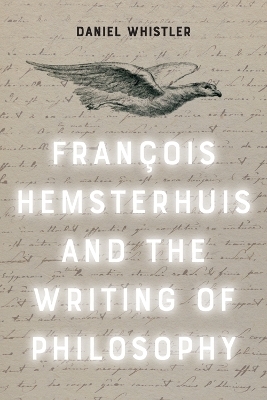
Francois Hemsterhuis and the Writing of Philosophy
Seiten
2024
Edinburgh University Press (Verlag)
978-1-3995-0983-1 (ISBN)
Edinburgh University Press (Verlag)
978-1-3995-0983-1 (ISBN)
Daniel Whistler argues that Hemsterhuis' philosophy matters and that its exclusion from the canon of modern philosophy has been unjust. This is not just because of its influence on later thinkers, but is primarily because Hemsterhuis' philosophy contains a rich assemblage of ideas and philosophical practices.
Francois Hemsterhuis (1721-1790) was the most significant Dutch philosopher after Spinoza. Daniel Whistler argues that Hemsterhuis' philosophy matters and that its exclusion from the canon of modern philosophy has been unjust. This is not just because of its reception history - its influence on later German thinkers, such as Goethe, Hamann, Hegel, Herder, Holderlin, Jean Paul, Kant, Jacobi, Novalis, Schelling, the Schlegels, Schleiermacher, Wieland - but is primarily because Hemsterhuis' philosophy contains a rich assemblage of ideas and philosophical practices. Whistler looks specifically at Hemsterhuis' reflections on philosophical style and the strategies he employs to communicate ideas in his late dialogues. Taking seriously Hemsterhuis' newly-published complete correspondence as a significant philosophical text, he contends that Hemsterhuis deserves to be placed alongside Shaftesbury, Hamann, Friedrich Schlegel, Kierkegaard and Nietzsche as one of the preeminent philosophical stylists of modernity.
Francois Hemsterhuis (1721-1790) was the most significant Dutch philosopher after Spinoza. Daniel Whistler argues that Hemsterhuis' philosophy matters and that its exclusion from the canon of modern philosophy has been unjust. This is not just because of its reception history - its influence on later German thinkers, such as Goethe, Hamann, Hegel, Herder, Holderlin, Jean Paul, Kant, Jacobi, Novalis, Schelling, the Schlegels, Schleiermacher, Wieland - but is primarily because Hemsterhuis' philosophy contains a rich assemblage of ideas and philosophical practices. Whistler looks specifically at Hemsterhuis' reflections on philosophical style and the strategies he employs to communicate ideas in his late dialogues. Taking seriously Hemsterhuis' newly-published complete correspondence as a significant philosophical text, he contends that Hemsterhuis deserves to be placed alongside Shaftesbury, Hamann, Friedrich Schlegel, Kierkegaard and Nietzsche as one of the preeminent philosophical stylists of modernity.
| Erscheinungsdatum | 22.08.2024 |
|---|---|
| Verlagsort | Edinburgh |
| Sprache | englisch |
| Maße | 156 x 234 mm |
| Themenwelt | Geisteswissenschaften ► Philosophie ► Geschichte der Philosophie |
| Geisteswissenschaften ► Philosophie ► Philosophie der Neuzeit | |
| ISBN-10 | 1-3995-0983-7 / 1399509837 |
| ISBN-13 | 978-1-3995-0983-1 / 9781399509831 |
| Zustand | Neuware |
| Haben Sie eine Frage zum Produkt? |
Mehr entdecken
aus dem Bereich
aus dem Bereich
die kolonialen Wurzeln der französischen Theorie
Buch | Hardcover (2024)
Matthes & Seitz Berlin (Verlag)
28,00 €
oder Das Leben Montaignes in einer Frage und zwanzig Antworten
Buch | Softcover (2023)
C.H.Beck (Verlag)
18,00 €


